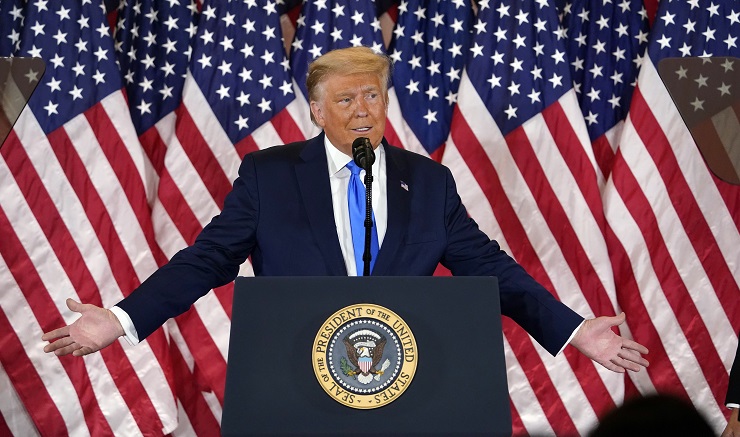In this new column, educator, ethicist and philosopher Dr Leslie Cannold presents both sides of an argument. This time, it’s all about Trump.
In this new column, educator, ethicist and philosopher Dr Leslie Cannold presents both sides of an argument. We invite you to pick which side Cannold actually believes, and share your own view as well. Send your thoughts to [email protected] with Both Sides Now in the subject line
In favour
American democracy is teetering on the brink. While Biden’s election may delay the ultimate fall of Rome, it won’t prevent it. Why? Because Trump was a symptom, not the cause, of America’s slide towards kleptocracy. This means that while the 45th president’s departure from the White House might slow the collapse of the world’s oldest republic, it won’t reverse the trend.
Why is America’s democracy so brittle? The reason was articulated most recently in a report by the Center for American Progress, which argues that demographic changes across the country — making it more educated and less white — spell the eventual end of the Republican party’s capacity to prevail in free and fair elections.
Women, people of colour and other marginalised groups disproportionately favour Democrats, and soon the vast majority of the electorate will be comprised of these groups who — if they get out and vote — will carry the day every time.
No wonder the Republicans are running scared, though Democrats should be, too. If one party has the numbers to ensure they always win, the other side will feel cheated and try to exert their will some other way. Say, by cheating or blind support for “their” leader whatever he says or does.
Even violence and civil war are possible if the disenfranchised truly feel there is no other way to make their voices heard.
Or the Republican party could change. There is nothing inevitable about women or people of colour turning their backs on conservative and populist parties. But inclusion won’t be easy. The terrible truth is that the exclusion and scapegoating of marginalised groups is what makes others — say, the infamous Trump base — feel they belong.
Could it happen in Australia? Some say no, but I disagree. Australia is different to America in a number of ways, but the similarities are striking. They include the visible absence of gender and other forms of diversity in the Liberal/National Parties, and the embrace of bigoted tropes, candidates and policies since the John Howard era to neutralise the electoral threat posed by Pauline Hanson and other racist parties.
Like the US, Australia is a multicultural nation with more than a quarter of our population born overseas. Our electorate is also polarised in a way that media academic Denis Muller attributes to the influence of News Corp in both countries.
Then there’s the growing income and wealth inequality in Australia that, while less stark than in the US, still sees the top 1% of Australians live in households with an average weekly income 26 times that of the bottom 5%.
Against
Hold on Tiger! Trump destroyed American democracy? The US has just had one of the most free and fair elections in its history, with turnout that — in a country where voting isn’t mandatory — topped the charts. In fact, Trump got more votes than any US President before him. Only problem for him is Biden got even more.
According to the international observers invited by the US State Department to monitor the 2020 vote, it all went down with barely a hitch. Given free and fair elections are the cornerstone of democracy, claims that US democracy is hurting, or that Trump is the cause of the imaginary decline, are fanciful.
Australia’s democracy is in good shape too. The success of the national cabinet process — which saw cooperation between the conservative federal and mostly Labor state governments — in orchestrating Australia’s effective response to COVID-19 is only the latest example of how effectively our system works. And while contempt for political leaders among Australians is high, so is our appreciation of the freedoms our democracy delivers. According to the 2019 Freedom in the World report, Australia ranks sixth of 86 independent nations that display the qualities of a liberal democracy.
Does all this mean that advanced democracies like Australia’s can’t do better? Not at all. As the authors of the Democracy 2025 report argue, the “legitimacy gap” that has opened up between the ideals of democracy and what Australians feel their democracy delivers provides an “urgent wake-up call” to Australia’s political and civic leaders.
Democracies are always declared to be in crisis, according to a parliamentary paper on the subject. And as our political forebearers have warned us as far back as the fourth century BC, the cost of freedom is eternal vigilance.
Which side do you believe? Send your thoughts to [email protected] with Both Sides Now in the subject line.




A lot can happen in 3 months.
3 months is a long time in 2020. Join us to make sense of it all.
Get you first 12 weeks of Crikey for just $12. Cancel anytime.
Peter Fray
Editor-in-chief of Crikey








